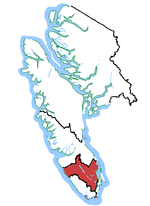Lake Cowichan
Lake Cowichan (Nitinaht: ʕaʔk̓ʷaq c̓uubaʕsaʔtx̣) (pop. 2,974) is a town located on the east end of Cowichan Lake and, by highway, is 27 kilometres (17 mi) west of Duncan, British Columbia. The town of Lake Cowichan was incorporated in 1944. The Cowichan River flows through the middle of the town. Cowichan River is designated as a Heritage River.Lake Cowichan is at the western end of the Trans Canada Trail, which, when completed, will be one of the longest trail networks in the world, almost 24,000 kilometres (15,000 mi) long. Youbou, with a population of about 1,000 people; Mesachie Lake, with a population of about 800 people; and Honeymoon Bay with a population of about 600 people, are nearby communities.
Excerpt from the Wikipedia article Lake Cowichan (License: CC BY-SA 3.0, Authors).Lake Cowichan
South Shore Road,
Geographical coordinates (GPS) Address Nearby Places Show on map
Geographical coordinates (GPS)
| Latitude | Longitude |
|---|---|
| N 48.825833333333 ° | E -124.05416666667 ° |
Address
South Shore Road 20
V0R 2G0
British Columbia, Canada
Open on Google Maps






